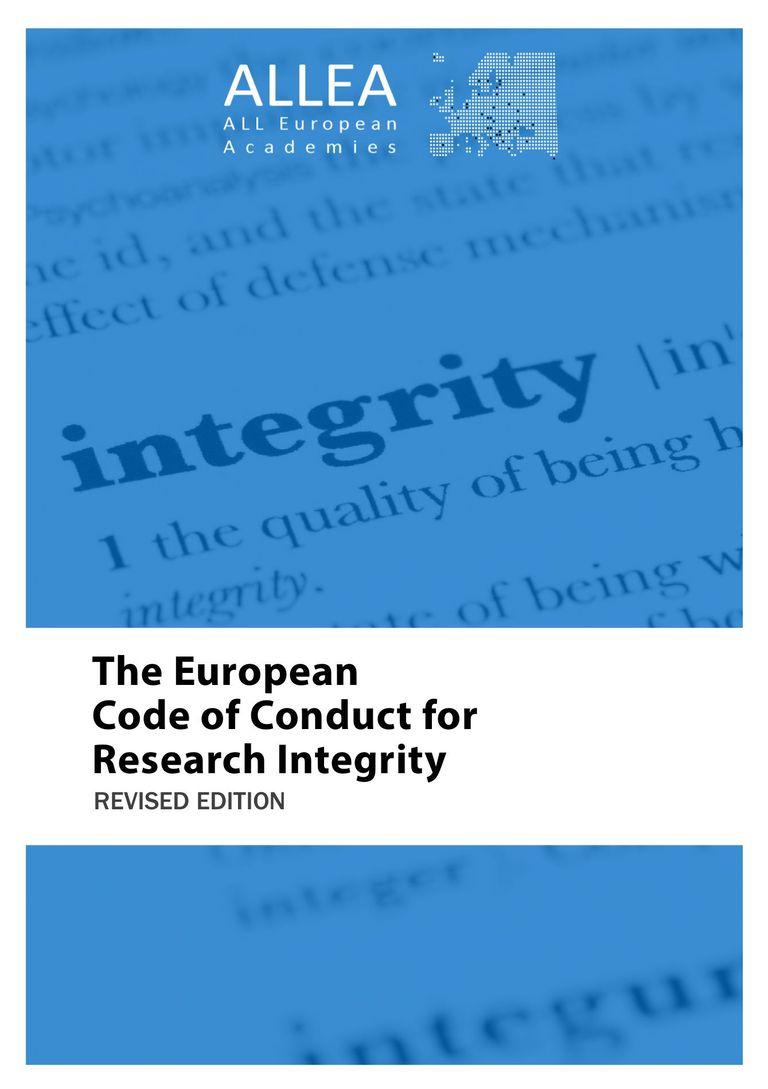Spotlight on Research Ethics and Research Integrity for sustainable innovation
Spotlight on Research Ethics and Research Integrity for Sustainable Innovation
Authored by: Maura Hiney, ALLEA Permanent Working Group Science and Ethics
Reviewed by: Camilla Leathem and Andrew Whittington-Davis

Research Ethics (RE) and Research Integrity (RI)
Ethics requires researchers to pay attention to and consider the potential effects of their research – both positive and negative – on research subjects and wider society, and to always strive to minimise any harmful effects. In research ethics, conflicts of values and interests between stakeholders (other researchers, users of the outputs, research subjects, society, future generations) are identified, solutions to these conflicts are sought, and the balance between harm and benefit is carefully weighed up in favour of benefit. Ensuring strong ethical values serves to make research trustworthy, reproducible and sustainable.
Research ethics sits within the broader ethos of research integrity, which aims to provide a comprehensive framework for researchers on how to carry out their work within accepted ethical frameworks whilst following good research practice. In the end research ethics and integrity should not only be a way to protect and be in concord with society, it should also be seen as the foundation of excellence in research and innovation. These ideas and practices are vital, especially with the availability of new forms of data, more advanced data acquisition tools, and the creation of new, and emerging technologies that have the capacity to cause significant economic and societal impact. This puts further pressure on this balancing act between harm and benefit, and in the absence of clear guidelines, risks pushing the pendulum more towards harm. This is why TechEthos aims to bring research ethics and integrity solutions to the forefront of technology innovation, making sure benefit is continually favoured.
RE and RI in the field of new and emerging technologies

ALLEA, the European Federation of Academies of Sciences and Humanities, has been a long-standing voice in the fields of research ethics and research integrity through its Permanent Working Group Science and Ethics, which has covered a wide range of issues relating to research ethics and integrity. This includes the development of the European Code of Conduct for Research Integrity in 2017, issued by ALLEA and recognised by the European Commission as the reference document for research integrity for all EU-funded research projects and a model for organisations and researchers across Europe. One of the main motivations for developing the European Code of Conduct was ALLEA’s recognition that the world of science has changed enormously over the past two decades, and that the ethical and research integrity approaches to new and emerging technologies are not yet fully understood in terms of their potential impacts on society and the economy. This poses challenges for the research community, funders and policymakers in terms of ensuring continued good research practice and strong ethical foundations for these advances.
Resources in the current RE + RI landscape
Europe has many existing ethics codes and guidelines to protect research subjects and broader society from any detrimental effects of research, and these have served us well. However, the radical nature of many technological innovations creates new ethical dilemmas about, for example, the very nature of being human, the potential to create fundamental societal inequalities and injustices, to make irreversible changes to the physical and cultural environment, breach basic privacy principles, impact on human freedom and autonomy, and open the door to potentially harmful misuse of new technologies. As a result, our current ethics codes are inadequate to deal with these challenges and this creates a gap in both understanding of and protection from the potential consequences of unchecked innovation. We urgently need new guidelines for the research and innovation community that can future-proof existing ethics and integrity principles and practices.
TechEthos RE + RI solutions
TechEthos will tackle this need for new guidelines by bringing ethical and societal values into the design and development of new and emerging technologies from the very beginning of the process. Such ‘ethics by design’ will allow for new, usable guidelines for the research community. In the end, the project will be developing guidelines for 3 exemplary new and emerging technologies across different domains. TechEthos will explore the ethical implications and potential consequences of several domains of knowledge advancement for which new codes and guidelines will be required. These can then become key supports to the European Code of Conduct and ensure that researchers have the best possible guidance on how to contribute their skills to the advancement of knowledge in a safe, considered and equitable way.
As a partner in the TechEthos project, ALLEA will contribute to enhancing existing legal and ethical frameworks by ensuring that TechEthos outputs are in line with The European Code of Conduct for Research Integrity, and identifying opportunities to borrow from TechEthos to inform future revisions of the Code. Linking new ethics guidelines to the European Code of Conduct will provide a common framework from which national and local codes and policies can be developed or updated to reflect current challenges. This will be important in ensuring consistency at a high level and promoting a common understanding of what constitutes good and ethical practice in research. This will not only benefit the research community but also enhance public trust in future research outputs.
To learn more about TechEthos follow the project on Twitter and LinkedIn, and sign up to the project newsletter. By joining the online community, you will be first in line to discover the technologies the project selects as the focus of its work and contribute to shaping the technologies of the future.
Share:



